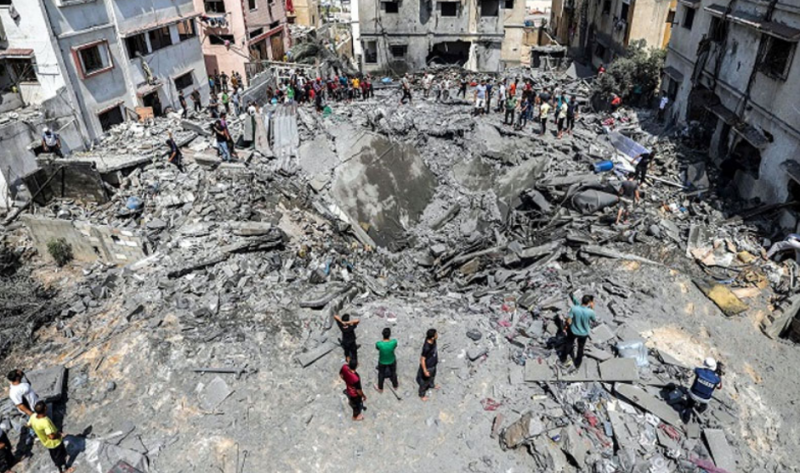Geneva (Web Desk/Agencies): The United Nations (UN) human rights chief on Tuesday said that Israel’s total siege of the Gaza Strip, depriving civilians of goods essential for survival, is banned under international law.
Volker Turk, the UN high commissioner for human rights, said people’s dignity and lives had to be respected as he called for all sides to defuse the “explosive powder-keg situation”.
In a statement, Turk said "International humanitarian law is clear: the obligation to take constant care to spare the civilian population and civilian objects remains applicable throughout the attacks."
The statement added that the siege risk seriously compounding the already dire human rights and humanitarian situation in Gaza, including the capacity of medical facilities to operate, especially in light of increasing numbers of injured.
"The imposition of sieges that endanger the lives of civilians by depriving them of goods essential for their survival is prohibited under international humanitarian law," Turk said.
Any restrictions on the movement of people and goods to implement a siege must be justified by military necessity or may otherwise amount to collective punishment, the statement added.
On the other hand, Israeli forces in their fresh air raids on fourth consecutive day today martyred dozens of Palestinians in the Gaza Strip.
Israeli bombing in several areas continued inside the besieged city since early morning.
Israel’s navy boats also launched several air strikes on the besieged city’s coast and Khan Younis.
Meanwhile, at least 788 hundred Palestinians including women and children, have been martyred by Israeli raids.
As per a UN report, The United Nations said 180,000 Palestinians had been made homeless, many huddling on streets or in schools. Smoke and flames rose into the morning sky, while bombardment of the roads often made it impossible for emergency crews to reach the scene of strikes.
On Monday, UN Secretary-General Antonio Guterres has condemned the Hamas attack against Israel, but said he was “deeply distressed” by the Jewish state’s subsequent imposition of a total siege on the Gaza Strip, as the Israeli-Palestinian conflict escalated.
“The humanitarian situation in Gaza was extremely dire before these hostilities,” the UN chief told reporters at UN headquarters in New York on Monday following a meeting with senior officials. “Now it will only deteriorate exponentially.”
Earlier in the day, Israeli Defence Minister Yoav Gallant said his country would impose a “complete siege” on the long blockaded enclave and stressed what this meant for its 2.3 million people: “No electricity, no food, no water, no gas — it’s all closed.”
Guterres said that he recognized the legitimate grievances of the Palestinian people and the legitimate security concerns of Israel, but underlined his rejection of terrorist acts and upheld the need to protect civilians.
“Let me begin by repeating my utter condemnation of the abhorrent attacks by Hamas and others against Israeli towns and villages in the Gaza periphery, which have left over 800 Israelis dead and more than 2,500 injured,” he said.
“Sadly, these numbers are expected to rise as the attacks are ongoing and many remain unaccounted for,” the UN chief added.
He further noted that over 100 Israelis, civilians and military, including women, children and the elderly, have been reported captured by armed groups. Some are being held hostage inside Israel and many others have been taken inside the Gaza Strip.
Meanwhile, Hamas and Palestinian Islamic Jihad have launched thousands of indiscriminate rockets that have reached central Israel, including Tel Aviv and Jerusalem.
“I recognize the legitimate grievances of the Palestinian people. But nothing can justify these acts of terror and the killing, maiming and abduction of civilians,” he said. “I reiterate my call to immediately cease these attacks and release all hostages.”
In the face of these unprecedented attacks, Israeli airstrikes have pounded Gaza, he continued.
“I am deeply alarmed by reports of over 500 Palestinians, including women and children, killed in Gaza and over 3,000 injured. Unfortunately, these numbers are rising by the minute as Israeli operations continue,” he said.
“While I recognize Israel’s legitimate security concerns, I also remind Israel that military operations must be conducted in strict accordance with international humanitarian law.”
The UN Secretary-General stressed that civilians must be respected and protected at all times and that civilian infrastructure must never be a target.
He pointed to reports that Israeli missiles had struck health facilities inside Gaza as well as multi-storied residential towers and a mosque. Two schools run by UNRWA, the UN agency that assists Palestinian refugees, that were sheltering displaced families in Gaza were also hit.
Overall, some 137,000 people are currently sheltering in UNRWA facilities, he continued, adding that numbers are increasing.
Guterres was deeply distressed by the announcement that Israel would initiate a complete siege of the Gaza Strip.
“The humanitarian situation in Gaza was extremely dire before these hostilities; now it will only deteriorate exponentially,” he said.
“I urge all sides and the relevant parties to allow United Nations access to deliver urgent humanitarian assistance to Palestinian civilians trapped and helpless in the Gaza Strip. I appeal to the international community to mobilize immediate humanitarian support for this effort.”
The UN chief said this most recent violence “does not come in a vacuum” but “grows out of a long-standing conflict, with a 56-year long occupation and no political end in sight.”
He appealed for an end to “the vicious cycle of bloodshed, hatred and polarization.”
“Israel must see its legitimate security needs materialized, and Palestinians must see a clear perspective for the establishment of their state realized,” he said.
“Only a negotiated peace that fulfills the legitimate national aspirations of Palestinians and Israelis, together with their security alike, the long-held vision of a two-state solution, in line with United Nations resolutions, international law and previous agreements, can bring long-term stability to the people of this land and the wider Middle East region.”


